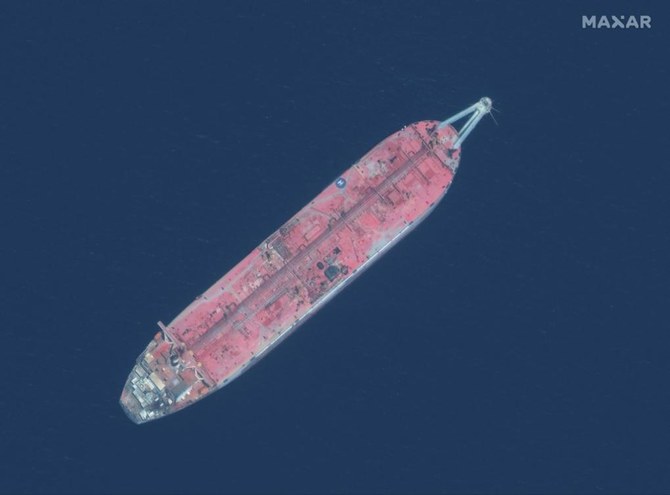NEW YORK CITY: The UN on Thursday announced it has signed an agreement with Belgian shipping company Euronav for the purchase of a Very Large Crude Carrier to use in its salvage operation to remove more than a million barrels of oil from the Safer, a derelict storage vessel moored in the Red Sea off the Yemeni coast, and avoid a massive environmental disaster.
The 47-year-old Safer has had little or no maintenance since the war in Yemen began in 2015 and has deteriorated to the point where experts warn it is in danger of springing a leak, exploding or catching fire.
It contains about 48 million gallons of oil, and the UN has warned that a spill could be four times bigger than the 1989 Exxon Valdez disaster off the coast of Alaska, which is considered the world’s worst oil spill in terms of environmental damage.
Achim Steiner, administrator of the UN Development Program, told Arab News that the vessel purchased by the UN cost “a painful $55 million,” after the agency searched in vain for a donated vessel or one that could be leased.
“The market clearly is so hot that, in the end, we had to conclude that the only way that we could advance rather than wait for someone’s generosity was to take the decision to not just charter the vessel but actually purchase it,” he said.
Experts estimate a major leak from the Safer could severely damage Red Sea ecosystems upon which about 30 million people depend for a living, including 1.6 million Yemenis, according to the UN. It would, for example, devastate fisheries along Yemen’s west coast and destroy livelihoods in fishing communities, many of which are already dependent on humanitarian aid to survive because of the war. If a fire broke out, more than 8.4 million people could be exposed to toxic pollutants.
A spill could also disrupt commercial shipping on the Red Sea, one of the world’s busiest waterways, which accounts for 10 percent of all global trade. It could also adversely affect littoral countries such as Saudi Arabia, Djibouti and Eritrea.
Steiner said the 15-year-old vessel purchased by the UN is in dry dock for regular maintenance and will sail within the next month to Yemen. Ship-to-ship transfer of oil could begin as soon as May.
The UNDP, which is organizing the operation as part of a UN-coordinated initiative, has contracted marine salvage company Smit to safely remove the oil and prepare the Safer for towing to a green salvage yard.
The salvage operation has been split into two phases: The oil will be transferred to the new vessel and then moved to a permanent storage facility until the political situation in Yemen allows for it to be sold or moved elsewhere.
David Gressly, the UN’s resident coordinator for Yemen, told Arab News that the original plan was to lease a salvage vessel but no supplier was willing to venture into an area that is “still in the midst of a civil war, even though the situation has calmed down considerably over the last year. That’s the primary reason. We had no choice, frankly, but to buy a vessel.”
The estimated cost of the salvage operation is $129 million, of which $75million has been secured so far.
Gressly made an urgent appeal for donors to provide the remaining cash.
“We’ve got almost all of the pieces together,” he said. “Let us have the last bit of funding and save hundreds of thousands of communities from the harm that this vessel could ultimately cause us.”

























